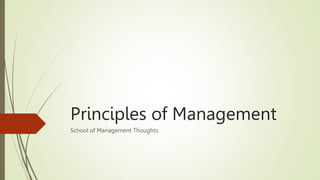
Principles of Management_ Scientific Management.pptx
- 1. Principles of Management School of Management Thoughts
- 2. Learning Objective Know the historical development of schools of management thought; Explain what a theory in management is; Outline the classification of management theories; Describe important schools of management, their contributions and limitations; Elaborate problems and conflicting issues in management theory
- 3. Why School Of thoughts are Important The purpose of studying various schools of management thought is to enable you to recognize and appreciate how developments in the field of management could contribute to current practices. An examination of these past and present approaches can help to discover the strengths and weaknesses of current managerial practices and finally enable you, as a potential manager of an information centre, to choose appropriate management styles.
- 4. CLASSIFICATION OF MANAGEMENT THEORIES CLASSICAL MANAGEMENT THEORY (l880s-1920s) A) Scientific Management B) Administrative Management C) Bureaucratic Organization
- 5. Scientific Management Frederick Winslow Taylor (1856-1915) is considered to he the father of scientific management. Henry Gantt, Frank and Lillian Gilberth and Harrington Emerson supported Taylor in his efforts Scientific management is the name given to the principles and practices that grew out of the work of Frederick Taylor and his followers and that are characterized by concern for efficiency and systematization in management.
- 6. Four basic parts of a series of ideas developed by Taylor are as follows Each person’s job should be broken down into elements and a scientific way to perform each clement should be determined. ii) Workers should be scientifically selected and trained to do the work in the designed and trained manner. iii) There should be good cooperation between management and workers so that tasks are performed in the designed manner. iv) There should he a division of labour between managers and workers. Managers should take over the work of supervising and setting up instructions and designing the work, and the workers should be free to perform the work himself.
- 7. Principles of Scientific Management by Taylor: 1.Science, not the Rule of Thumb- 2. Harmony, Not Discord- 3. Mental Revolution- 4. Cooperation, not Individualism- 5. Development of Every Person to his Greatest Efficiency-
- 8. Takeaway The scientific method provides a logical framework for the analysis of problems. It basically consists of defining the problem, gathering data, analysing the data, developing alternatives, and selecting the best alternative. Taylor believed that following the scientific method would provide a way to determine the most efficient way to perform work
- 9. Some Other Scientific Principles Gantt was a contemporary and an associate of Taylor. He emphasized the psychology of the worker and the importance of morale in production. Frank and Lillian Gilbert concentrated on time-and-motion study to develop more efficient ways of performing repetitive tasks. Time-and-motion study is a process of analysing jobs to determine the best movements for performing each task. Time-and-motion study and piece-rate incentives are two major managerial practices developed by scientific management theorists and widely used even today
- 10. Limitation No man is entirely an ‘economic man’ and man’s behaviour is dictated not only by financial needs, but by other needs like social needs, security needs and esteem needs. Secondly, there is no such thing as ‘one best way’ of doing a job so far as the component motions are concerned and hence time and motion study may not be entirely scientific. Thirdly, separation of planning and doing a job and the greater specialization inherent in the system tend to reduce the need for skill and produce greater monotony of work Lastly, advances in methods and better tools amid machines eliminated some workers, causing resentment from them.